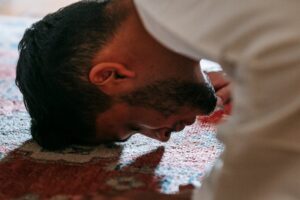With the end of the month of Ramadan approaching, questions about Zakat al-Fitr abound, and in this article, I will summarize the most important provisions of this important act of worship.
- What is Zakat al-Fitr?
Zakat al-Fitr – or Sadaqat al-Fitr – is an obligatory charity for every able Muslim, which he pays – before the Eid prayer – on behalf of himself and his family members.
- What is the ruling on zakat al-Fitr in Islam? And who is obligated to pay it?
According to the agreement of the scholars: Zakat al-Fitr is obligatory, for every able Muslim to pay it on his own behalf and on behalf of his dependents, such as his wife and children, even the infant among them, and it is desirable to give it on behalf of the unborn fetus.
- Why do we pay Zakat al-Fitr? (The wisdom behind Zakat al-Fitr)
Ibn Abbas narrated that the Messenger of Allah (ﷺ) enjoined Zakat al-Fitr as a purification for the fasting person from idle talk and obscenities, and to feed the poor. (Abu Dawood 1609, Ibn Maja 1827 – Grade: Hasan)
From this hadith we conclude that the wisdom of this charity are two things:
- The purification of fasting from idle talk and obscenity and making up for the deficiency that occurred in it because of that.
- Sympathizing with the needy people and helping them so that they can enjoy the days of Eid with the other Muslims.
In addition, this charity includes the meaning of thanking the Lord for His blessings, such as health, wealth, and family.
- How to give it? Does it have to be paid in money or food?
The Messenger (PBUH) commanded the companions of his time to pay Zakat al-Fitr from the food available in their homes, as this was the easiest for them – due to the lack of money coins in that era – while the needy were able to benefit from that food by consuming it in their homes or exchanging it in the market for what they needed through barter.
On the other hand, given the development of the economic system, and the changing in the needs of needy families in our current time, it has become necessary to pay Zakat al-Fitr in the form of cash, since this is the most beneficial for the needy ones while paying it in the form of food leads to the loss of its purposes, and may harm the poor who will lose most of its benefits in this way.
- How much is it?
Determining the amount of Zakat al-Fitr varies from one country to another, and regarding the greater Chicago area, a group of imams set the amount of Zakat al-Fitr for this year at $15 per person.
However, this should be the minimum amount that the able Muslim should give, and the ones who are blessed with high income should give out more than that according to their financial capabilities, “Whoever has abundant means, let him spend according to his means; and he whose provision is restricted, let him spend out of what Allah has given him. Allah does not burden anyone beyond the means that He has bestowed upon.” (65:7).
- To whom should Zakat al-Fitr be given?
Those who are entitled to Zakat al-Fitr – according to the most correct opinion – are the poor and needy Muslims, and they are – in the concept of our time – who do not have the income that covers their needs, such as housing, food, drink, clothing, education, transportation, and other requirements of life. And regarding zakat al-Fitr, this applies to families who face hardship in meeting the requirements of Eid, such as clothes, toys, gifts, and so on.
- Can I give it to my needy relatives?
Yes. Actually, the people who are most deserving of this are those who have ties of kinship, such as brothers, sisters, aunts, and the like, if they are among the deserving ones.
- Can I give it to my children or parents?
Basically, Zakat and Sadaqat al-Fitr should not be given to children or parents, because spending on them falls under the responsibility of the giver.
However, it is permissible for the parents to pay it to their needy sons and daughters, and vice versa, if they are financially independent of each other, that each of them has his own family and independent income. Rather, they are the first eligible for this charity in this case.
- Do I have to pay Zakat al-Fitr myself or can I delegate someone to do it?
The Muslim can pay zakat al-Fitr himself to those who are entitled to it, or delegate someone he trusts to do it on his behalf. He may also give money to Islamic centers, charitable institutions, relief organizations, and trusted zakat committees, which undertake the task of delivering such alms to those who deserve it.
- Does the giver have to inform the recipient that it is charity on him?
No. On the contrary, it is not recommended to inform the recipient that it is charity on him, so as not to cause him embarrassment. Rather, this may fall under the category of harm that may invalidate the reward of the charity.
Rather, it is recommended that he present it to him in the form of a gift, or something similar, and the intention of charity in the heart of the giver, even if the recipient is not aware of it, is sufficient to fulfill this act of worship.
- When Zakat al-Fitr is due?
According to what was mentioned in the previous hadith of Ibn Abbas, Zakat al-Fitr must be paid before the Eid prayer, and some scholars have permitted it to be given one or two days before the day of Eid.
But at the present time, it is more likely that it is permissible to pay it from the beginning of the month of Ramadan, so that it can be delivered to the needy, and they can buy their needs on the day of Eid, especially in countries where prices rise significantly before the days of Eid.
- Where should zakat al-Fitr be paid?
Basically, zakat al-Fitr must be paid to those who are entitled to it in the same country in which the payer lives.
However, it is permissible to send it to the needy in a country other than the country of the payer if there is a need for that, or if an interest arises, such as sending it to his needy relatives overseas, or to Muslims who are more in need in other countries.
May Allah accept our good deeds, and Eid Mubarak to everyone.
By Sheikh Haitham Alzamareeh




